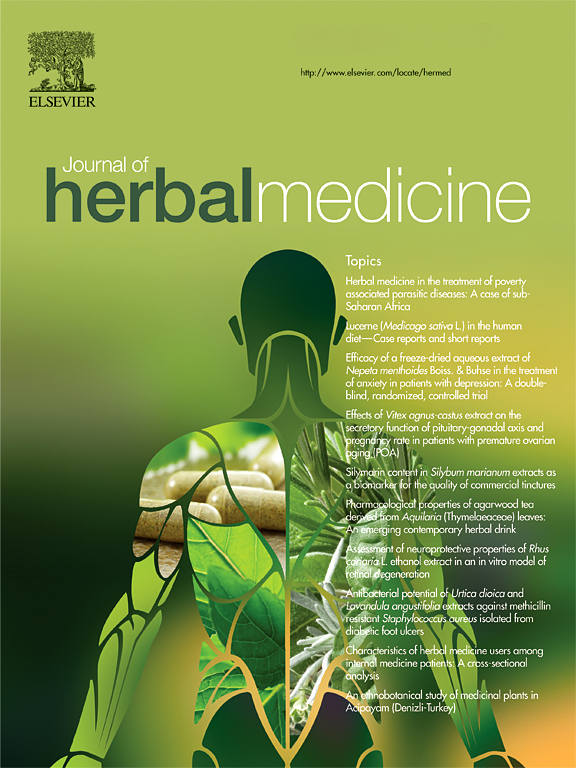中西医结合治疗代谢综合征疗效的贝叶斯网络meta分析
IF 1.9
4区 医学
Q2 INTEGRATIVE & COMPLEMENTARY MEDICINE
引用次数: 0
摘要
代谢综合征(MetS)是多种危险因素的集合。中医与西医结合治疗代谢代谢综合征(MetS)具有广阔的前景。然而,中西医结合治疗MetS的不同综合治疗方法的有效性仍然是一个持续争论的主题。方法检索spubmed、Cochrane Library、Embase、Web of Science及4个中文数据库。我们评估了纳入研究的偏倚风险和质量,并进行了贝叶斯多网络meta分析。结果纳入30项随机对照试验。基于贝叶斯网络的meta分析显示,大柴胡汤联合水杨汤治疗MetS的临床疗效最优。黄连文丹汤+大柴胡汤与CWM联合用药对改善患者体质指数(BMI)的效果最为有利;葛根芩连汤+平胃散联合中药减腰围效果显著;在多种治疗措施中,五灵散联合CWM对提高患者高密度脂蛋白胆固醇(HDL-c)水平更为有效。结论中西医结合治疗MetS疗效显著,优于单用中药。本研究通过中西医结合的综合方法,确定了针对不同结局指标的最佳干预策略。然而,由于本研究的局限性,未来需要更多高质量的研究来提供有力的证据。本文章由计算机程序翻译,如有差异,请以英文原文为准。

Efficacy of traditional Chinese medicine combined with conventional western medicine on metabolic syndrome: a Bayesian network meta-analysis
Introduction
Metabolic syndrome (MetS) is a cluster of multiple risk factors. The combination of traditional Chinese medicine (TCM) and conventional western medicine (CWM) shows promise in treating MetS. However, the effectiveness of different integrated treatments combining TCM and CWM for MetS remains a subject of ongoing debate.
Methods
PubMed, Cochrane Library, Embase, Web of Science, and four Chinese databases were searched. We evaluated the risk of bias and quality in the included studies, and performed a Bayesian multiple network meta-analysis.
Results
We included 30 randomised controlled trials. Meta-analysis based on Bayesian network demonstrated that the combination of Dachaihu decoction and CWM exhibited the most excellent clinical treatment efficacy on MetS. The combination of HuanglianWendan decoction + Dachaihu decoction and CWM demonstrated the most favourable impact on improving patient body mass index (BMI); the combination of Gegen Qinlian decoction + Pingwei San and CWM exhibited a significant effect in reducing patient waist circumference; among various treatment measures, Wuling San combined with CWM had been proven to be more effective in enhancing high-density lipoprotein cholesterol (HDL-c) levels in patients.
Conclusion
The combination of TCM and CWM exhibits a pronounced therapeutic efficacy in the management of MetS, surpassing the use of CWM alone. This study identified the optimal intervention strategies for different outcome indicators by combining TCM and CWM in a comprehensive manner. However, due to the limitations of this study, more high-quality studies are needed to provide robust evidence in the future.
求助全文
通过发布文献求助,成功后即可免费获取论文全文。
去求助
来源期刊

Journal of Herbal Medicine
INTEGRATIVE & COMPLEMENTARY MEDICINE-
CiteScore
3.90
自引率
0.00%
发文量
94
期刊介绍:
The Journal of Herbal Medicine, the official journal of the National Institute of Medical Herbalists, is a peer reviewed journal which aims to serve its readers as an authoritative resource on the profession and practice of herbal medicine. The content areas of the journal reflect the interests of Medical Herbalists and other health professionals interested in the clinical and professional application of botanical medicines. The objective is to strengthen the research and educational base of herbal medicine with research papers in the form of case studies, original research articles and reviews, monographs, clinical trials and relevant in vitro studies. It also publishes policy statements, opinion pieces, book reviews, conference proceedings and profession related information such as pharmacovigilance reports providing an information source for not only the Herbal Practitioner but any Health professional with an interest in phytotherapy.
 求助内容:
求助内容: 应助结果提醒方式:
应助结果提醒方式:


